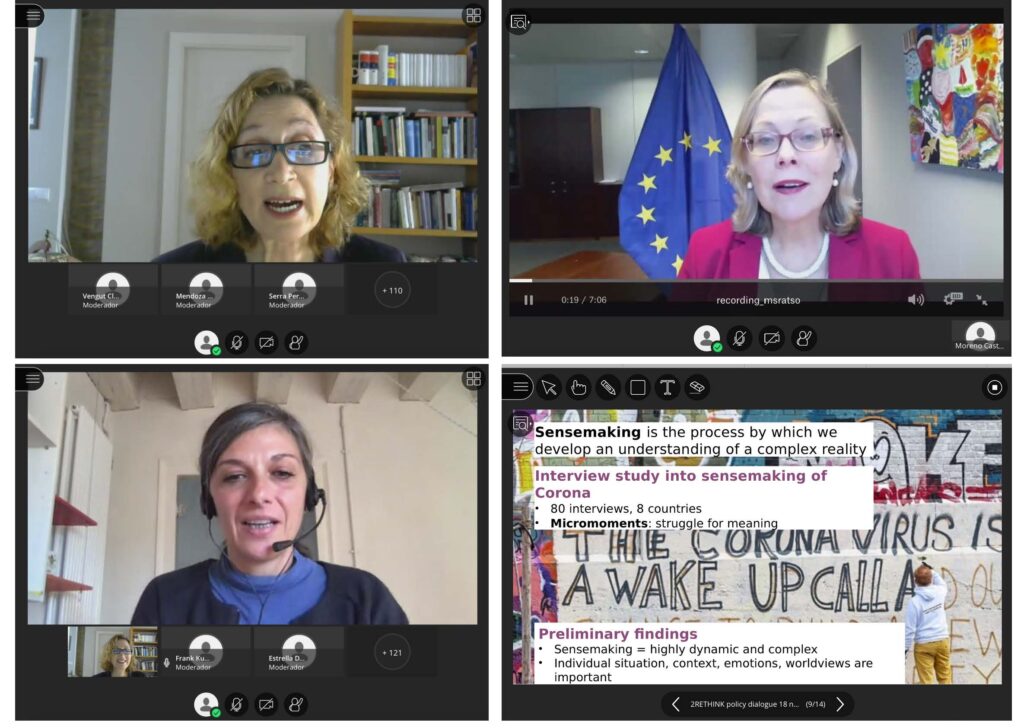On November 18th, CONCISE hosted a European Policy Dialogue on science communication, where the consortium presented project findings and recommendations to improve science communication in front of policymakers and relevant stakeholders. The event took place online and brought together 157 people.
The attendees were welcomed by Carolina Moreno, our project coordinator. Signe Ratso, Deputy Director General at DG Research and Innovation of the European Commission, highlighted the importance of science communication: “the communication of science” – she said – “is essential to transfer scientific knowledge and recommendations on crucial issues to society”. In this regard, she underlined how the COVID-19 pandemic has highlighted the importance of science communication to respond to threats to public health and build public confidence in how the pandemic is tackled. Estrella Durá and Lina Gálvez, members of the Group of the Progressive Alliance of Socialists and Democrats in the European Parliament, also participated to the event. In their speeches, both highlighted the need of reinforcing collaboration between science, communication and politics and the relevance of accurate information for the protection of citizens’ lives.

CONCISE recommendations for science communication
Carolina Moreno, CONCISE project coordinator, presented the conclusions reached by the CONCISE research team after analysing the data obtained in the citizen consultations in three areas: how citizens are informed, the reliability of the sources and channels citizens use, and what suggestions citizens propose to improve science communication.
Thus, from the analysis, the team verified that citizens demand opening spaces to addressing even the most controversial issues in which science can offer useful recommendations. In addition, they ask for the promotion of science programmes on public television, as well as specific training for journalists. Citizens are also demanding an increase in public funding for science and science communication and granting universities and public research centres a more relevant role.
Regarding the reliability of sources and channels, the study verified that levels of trust vary between countries and individuals. In any case, citizens tend to view digital media as less reliable with respect to scientific information. At the same time, for citizens, the message is as important as the format: a poorly articulated source of information is perceived as less precise.
In short, the CONCISE team’s recommendations include the need of promoting research centres and researchers to disseminate their results. It is also considered essential to guarantee access to information under equal conditions and to include the transversal importance of science and scientific issues in all subjects during compulsory education. The consortium highlighted the relevance of the ‘scientific method’ throughout the educational path to reinforce critical thinking. In addition, there is a need to support the creation of a network of science shops that help to debunk fake news that operate “defence systems” to combat pseudosciences and promote scientific facts. Another proposed recommendation includes the promotion of a clear and rigorous labelling that allows citizens to make informed choices.
A wider event on science communication
The event also included the participation of ReThink and Quest projects. Both projects were funded by the European Union within the same call and topic as CONCISE, meaning they all aim to delve into the state of science communication in Europe to propose improvements to reach a greater diversity of audiences.
Frank Kupper, coordinator of the ReThink project, explained their objectives: “ReThink aspires to develop resources for science communicators and journalists in order to move to an ecosystem where science communicators don’t tell citizens what to think, but rather support dialogue that already exists in society”.
On the other hand, Alessandra Fornetti, coordinator of the QUEST project, presented the twelve quality indicators that define what is quality in science communication. As the coordinator explained, “QUEST has confirmed the fundamental role that policy can play in promoting quality communication in social networks, media and museums”.
CONCISE policy briefs
The CONCISE data analysis has resulted in some policy briefs that consortium members have developed for each participating country, as well as a common policy brief for Europe. These documents include recommendations to improve the communication of science based on the analysis of the discourse of the participants in the consultations.
The CONCISE policy briefs are already available on the project’s website.
Presentations used during the event: CONCISE | RETHINK | QUEST
Ana Serra, Amaia Crespo & Edurne Gaston.

Os comentários estão fechados.